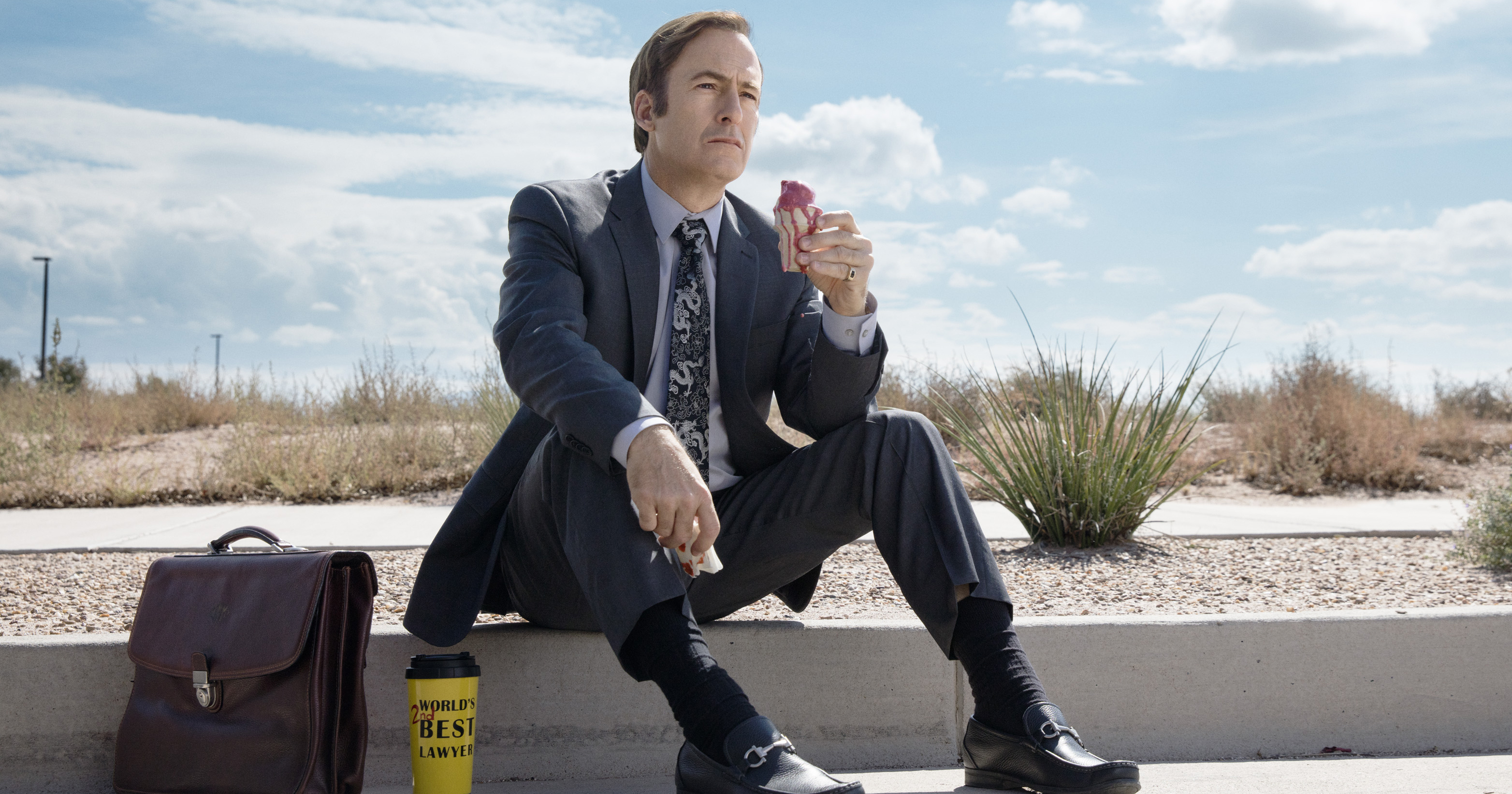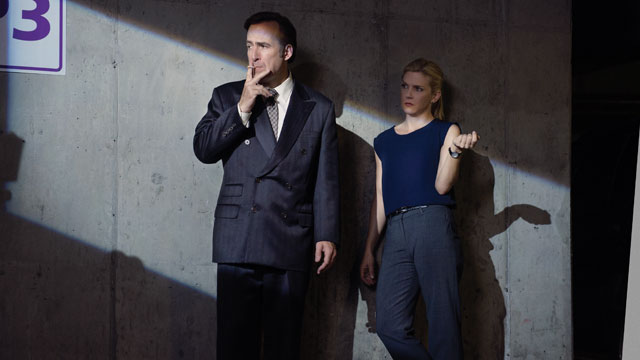The appearance of a sequel, prequel, or spinoff often signals an attempt to wring the last bit of juice (or cash) out of a proven success: an opportunity for fans to enjoy a familiar dish, warmed over and served up with only a slight variation in flavor. How unexpected and satisfying, then, that Better Call Saul—which features several characters from the popular AMC series Breaking Bad and which has just completed its second season—should offer us something so entirely new. The show features a female character quite unlike any we may have seen in film or on TV; an unusually persuasive portrayal of how an easy romantic friendship can turn into a more difficult love affair; and a vision of fraternal conflict that is morally complex, highly nuanced, and dramatic, at once understandable and extremely peculiar. The new season has proven to be even stronger, funnier, and more focused than the first.
One need not have watched Breaking Bad to enjoy Better Call Saul, but viewers of the earlier series will enjoy learning something (though certainly not everything) about the histories of some of its most engaging characters: what happened before their paths intersected with that of the chemistry-teacher-turned-meth-mogul, Walter White. At the show’s center is Jimmy McGill (Bob Odenkirk), a lawyer who will (we know) reinvent himself as Saul Goodman, with an office in a strip mall, hucksterish TV ads for his practice featuring the slogan that gives the new show its title, and a clientele ranging from Albuquerque’s beleaguered poor to at least one of its successful drug lords.
A talented grifter, known as “Slippin’ Jimmy” since childhood, our hero is, by nature, a rule-breaker (or rule-bender) who keeps trying and failing to play by the rules. As the first season opens, we find Jimmy working as a poorly paid public defender while living in, and managing his minimal legal practice from, a windowless room behind a busy Asian nail salon. Shadiness has never seemed so eloquent or appealing as it does when Jimmy is defending obviously guilty clients, among them, three boys caught, on camera, sodomizing the decapitated head of a corpse in a funeral home. In a speech he’s manically rehearsed in the men’s room, as if the urinals were a jury, Jimmy attempts to portray their horrifying act as an instance of good, clean teenage fun. His outrageous flights of rhetoric and hand gestures recall those of a revivalist preacher, and he reminds us of how attractive a good talker can be, almost regardless of what he’s saying.
During Jimmy’s off hours (of which he has plenty) he takes care of his brother Chuck (Michael McKean), a respected, high-powered attorney reduced to a housebound recluse by a mysterious, crippling (and, we can’t help thinking, psychosomatic) “allergy” to electromagnetic radiation. Chuck insists that visitors leave their cell phones outside in the mailbox, and he wraps himself in a foil blanket (“like a baked potato,” says Jimmy) to repel the harmful rays that may have penetrated the perpetual darkness of his home.
As the second season develops, Chuck emerges as Jimmy’s great adversary in a fraternal struggle of quasi-Biblical proportions. In fact, the only thing that can rouse Chuck from his waking coma is his desire to ruin Jimmy’s chances of happiness and success. And as the two men try to outmaneuver one another, what’s interesting is the odd distribution of virtues and vices, strengths and liabilities between Chuck (brilliant, mean-spirited, vengeful, and pure and absolutist in his view of the law, if not the truth) and Jimmy (brilliant, decent, kind-hearted, but slippery and way less upright in his approach to the legal system.) Watching them compels us to consider what we mean by “honest,” and what’s most disturbing is to see Chuck use Jimmy’s brotherly love and concern as a targeted, uniquely effective weapon against him.
Happily, Jimmy has allies. There’s Mike Ehrmantraut (Jonathan Banks), also familiar from Breaking Bad, a former Philadelphia cop and “fixer” who deals with his friends (Jimmy) and enemies (crime bosses and assassins working for a Mexican drug cartel) with the imperturbable calm of a Zen master, and whose chilly competence is leavened by his principal motivation: a profound and tender love for his little granddaughter. Kim Wexler (Rhea Seehorn), an ambitious and diligent lawyer working at the firm which Chuck helped found, has an unclear relationship with Jimmy. Is it a friendship or romance? Our uncertainty is another narrative hook.
Whatever their connection was, it deepens into love as the second season progresses. Kim’s feelings for Jimmy jeopardizes her career as she must balance her loyalty to him against her professionalism, her sense of right and wrong, her allegiance to the firm, and her hopes and plans for her own future. She has great depth and intelligence, a laid-back sense of humor, a moral probity mitigated (or marred) only slightly by her attraction to Jimmy’s borderline criminality; his scamming turns her on. She knows who he is and what he does, and tells him, for her own good, that she doesn’t want to talk about it. Ever.
Advertisement
Watching Kim makes you aware of what an unusual female character she is, and of how relatively one-dimensional and predictable are the parts more often written for the talented actresses playing lawyers on shows such as The Good Wife. Consciously or unconsciously, we register the countless instances in which a small gesture reveals Kim’s nature. In the first season, in the second scene in which she appears, she’s grabbing a quick smoke with Jimmy in the law firm’s parking garage. With a few mild words, she refuses Jimmy’s half-expressed suggestion that she do something to make the firm offer the sidelined, incapacitated Chuck a bigger buy-out payment.
As she heads back upstairs, she notices that a trash can has fallen over. Acting with a quick, instinctive thoughtfulness that reads as the opposite of self-involvement and mindless privilege, she stops and rights it, replacing the lid. If she doesn’t do it, someone else will have to: presumably a worker many rungs beneath her. Later we’ll learn just enough about how hard Kim has worked to overcome the disadvantages of class and money and make her way to a firm like Hamlin Hamlin McGill. Having left a dead-end town in the Midwest, she’s started off in the mailroom, and the firm has paid her law-school tuition. Everything about her makes sense; she seems more like a person than a character on TV. In the final episode, Jimmy has been called away on an emergency involving Chuck and asks Kim to make the coffee he’s promised the bedraggled clients stalled in his waiting room. Kim balks—the request to get the coffee is, of course, an archetypal insult for a professional woman, in this case a “solo practitioner”—but ultimately she shrugs and asks the patient clients which of them wants coffee.
Created and written, like Breaking Bad, by Vince Gilligan and Peter Gould, the show is as ingeniously plotted and beautifully shot as its predecessor. It’s less scenic—Jimmy spends more time in corporate offices and dark houses, and less in the gorgeous high desert where Walter White batched his meth. But we always know where we are. The locations (vintage hot dog joints, fancy hotel bars, Mexican juice and taco stands) are inspired; the camera captures that special, clear Southwestern light, and the film editors have, over the show’s two seasons, gotten increasingly artful and daring in their use of montage and jump-cuts. (A certain amount of humor is generated by the length of time the camera lingers on a face, registering a slowly dawning realization or reaction; it’s the cinematic equivalent of a comic double take.) And though the bloody machinations of the drug cartels generate a steady thrum of tension, the show is (comparatively) less violent than “Breaking Bad,” though it is, in its own fashion, no less dark. Some of that darkness is generated by Jimmy’s inability to not be who he is; his authenticity inevitably creates a difficult situation for himself and everyone else. He is constantly doing the right thing in the totally wrong way.
Mostly what the two series share is a high tolerance for ambiguity and the extreme contradictions that can exist within a single person. Week by week, episode by episode, Better Call Saul raises the stakes for its characters, until a beef between two brothers takes on the intensity of an epic fight for dominance. A skirmish with the drug cartel (a problem caused by a low-level scam gone wrong) threatens the lives and safety of the guilty and innocent alike, and reveals the criminals to be as smart, as conscious, and as fully developed as their civilian neighbors.
Ultimately, what makes the show so good—aside from its humor and originality, the quality of the acting, dialogue and plotting, its eye for the natural and man-made visual pleasures of New Mexico—is its affectionate respect for its painfully flawed, admirably brave, human characters. We see our own efforts, dreams and imperfections in these honest or shady lawyers, these scammers and fixers struggling to keep from going under, seeking love and approval in obviously the wrong places. As happens with good fiction, these characters populate our psyches during the time we spend among them. When this season of Better Call Saul ends, as it did this week, something is missing. The absence of Jimmy and Kim, Chuck and Mike leaves a gap, an empty and slightly mournful space in their regular Monday night time slot.
Advertisement
Both seasons of Better Call Saul can be streamed on a variety of channels and services.




